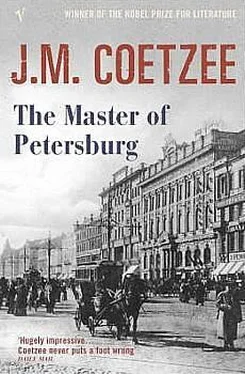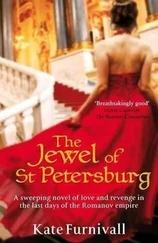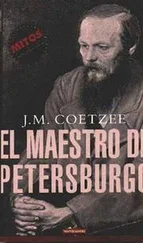There is a tap at the door: Matryona, in her nightdress, for an instant looking startlingly like her mother. 'Can I come in?' she says in a husky voice.
'Is your throat still sore?'
'Mm.'
She sits down on the bed. Even at this distance he can hear how troubled her breathing is.
Why is she here? Does she want to make peace? Is she too being worn down?
'Pavel used to sit like that when he was writing,' she says. 'I thought you were Pavel when I came in.'
'I am in the middle of something,' he says. 'Do you mind if I go on?'
She sits quietly behind him and watches while he writes. The air in the room is electric: even the dust-motes seem to be suspended.
'Do you like your name?' he says quietly, after a while.
'My own name?'
'Yes. Matryona.'
'No, I hate it. My father chose it. I don't know why I have to have it. It was my grandmother's name. She died before I was born.'
'I have another name for you. Dusha.' He writes the name at the head of the page, shows it to her. 'Do you like it?'
She does not answer.
'What really happened to Pavel?' he says. 'Do you know?'
'I think… I think he gave himself up.'
'Gave himself up for what?'
'For the future. So that he could be one of the martyrs.'
'Martyrs? What is a martyr?'
She hesitates. 'Someone who gives himself up. For the future.'
'Was that Finnish girl a martyr too?'
She nods.
He wonders whether Pavel had grown used to speaking in formulas too, by the end. For the first time it occurs to him that Pavel might be better dead. Now that he has thought the thought, he faces it squarely, not disowning it.
A war: the old against the young, the young against the old.
'You must go now,' he says. 'I have work to do.'
He heads the next page the child, and writes:
One day a letter arrives for him, his name and address written out in slow, neat block letters. The child takes it from the concierge and leaves it propped against the mirror in his room.
'That letter – do you want to know who sent it?' he remarks casually when he and she are next alone together. And he tells her the story of Maria Lebyatkin, of how Maria disgraced her brother Captain Lebyatkin and became the laughing-stock of Tver by claiming that an admirer, whose identity she coyly refused to disclose, was asking for her hand.
'Is the letter from Maria?' asks the child.
'Wait and you will hear.'
'But why did they laugh at her? Why shouldn't someone want to marry her?'
'Because Maria was simple, and simple people should not marry for fear they will bear simple children, and the simple children will then have simple children themselves, and so forth, till the whole land is full of simple people. Like an epidemic'
'An epidemic?'
'Yes. Do you want me to go on? It all happened last summer while I was visiting my aunt. I heard the story of Maria and her phantom admirer and decided to do something about it. First of all I had a white suit made, so that I would look gallant enough for the part.'
'This suit?'
'Yes, this suit. By the time it was ready, everyone knew what was up – in Tver news travels fast. I put on the suit and with a bunch of flowers went calling on the Lebyatkins. The captain was mystified, but his sister wasn't. She had never lost her faith. From then on I called every day. Once I took her for a walk in the forest, just the two of us. That was the day before I set off for Petersburg.'
'So were you her admirer all the time?'
'No, that's not how it was. The admirer was just a dream she had. Simple people can't tell the difference between dreams and the real thing. They believe in dreams. She thought I was the dream. Because I behaved, you know, like a dream.'
'And will you go back and see her?'
'I don't think so. In fact, certainly not. And if she comes looking for me, you must be sure not to let her in. Say I have changed lodgings. Say you don't know my address. Or give her a false address. Make one up. You'll recognize her at once. She is tall and bony and her teeth stick out, and she smiles all the time. In fact she's a kind of witch.'
'Is that what she says in the letter – that she is coming here?'
'Yes.'
'But why -?'
'Why did I do it? For a joke. Summer in the country is so boring – you have no idea how boring.'
It takes him no more than ten minutes to write the scene, with not a word blotted. In a final version it would have to be fuller, but for present purposes this is enough. He gets up, leaving the two pages open on the table.
It is an assault upon the innocence of a child. It is an act for which he can expect no forgiveness. With it he has crossed the threshold. Now God must speak, now God dare no longer remain silent. To corrupt a child is to force God. The device he has made arches and springs shut like a trap, a trap to catch God.
He knows what he is doing. At the same time, in this contest of cunning between himself and God, he is outside himself, perhaps outside his soul. Somewhere he stands and watches while he and God circle each other. And time stands still and watches too. Time is suspended, everything is suspended before the fall.
I have lost my place in my soul, he thinks.
He picks up his hat and leaves his lodgings. He does not recognize the hat, has no idea whose shoes he is wearing. In fact, he recognizes nothing of himself. If he were to look in a mirror now, he would not be surprised if another face were to loom up, staring back blindly at him.
He has betrayed everyone; nor does he see that his betrayals could go deeper. If he ever wanted to know whether betrayal tasted more like vinegar or like gall, now is the time.
But there is no taste at all in his mouth, just as there is no weight on his heart. His heart, in fact, feels quite empty. He had not known beforehand it would be like this. But how could he have known? Not torment but a dull absence of torment. Like a soldier shot on the battlefield, bleeding, seeing the blood, feeling no pain, wondering: Am I dead already?
It seems to him a great price to pay. They pay him lots of money for writing books, said the child, repeating the dead child. What they failed to say was that he had to give up his soul in return.
Now he begins to taste it. It tastes like gall.
***














